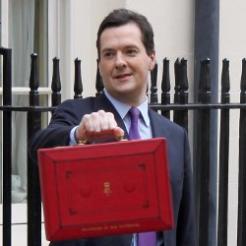In just over two weeks Chancellor George Osborne will deliver his Budget for 2014. Asheem Singh outlines what Acevo wants to see in it.
On 19 March, George Osborne will tell us what he’s going to do with our money. Few political events bring the soothsayers out in such force as the Budget. Will the Chancellor offer a pre-election splurge or stick to type? Will it be a sunnier forecast than in previous years or will he play down the hype? Will he have a gin and tonic beforehand or will he stick to mineral water? It goes on.
What is certain is that this year’s Budget is a game of poker in which charities and social enterprises, many of whom have seen a huge upturn in the demand for services, must emerge with a better hand than previously. With that in mind, here are four things we think charities need to be looking out for over the course of the day.
1. Infrastructure, infrastructure, infrastructure
The austerity years didn’t totally eviscerate the voluntary sector’s infrastructure – but they came close. On the plus side, there have been government initiatives such as the Commissioning Academy, which aimed to improve public services, and the Investment and Contract Readiness Fund, which supports charities and social enterprises to grow. They should be ripe for a top-up. The government’s support for social investment is pathbreaking and will be augmented too.
But not enough is being done to support organisations affected by local government cuts. In our submission to the Chancellor, we at Acevo argued for the creation of a new Community Recovery and Sustainability Fund to support the growth and development of local voluntary organisations still reeling from years of cuts. Keep an ear out for this during the Budget - or indeed after.
2. Early intervention now, big savings later
In previous Budgets, the Chancellor prioritised ‘early intervention’ – preventing harm before we have to deal with its consequences. The government created an Early Intervention Foundation to put the theory into practice and offered early help for at-risk pre-schoolers last year.
Will the Chancellor stick or twist on this agenda? If he twists, health and care may well be next on his radar. Despite the difficulty of the politics, long-term demographic and financial pressures might impel the Chancellor towards voluntary-sector, community-based approaches.
The Prevention Revolution, the report of the 2013 Acevo Prevention Taskforce chaired by Sir Hugh Taylor, explored this issue. It recommended the creation of an NHS Investment Initiative, a sort of bank that would fund innovative new forms of health provision and provide access to capital for providers from the charity and social enterprise sectors. It’s perhaps too soon to see am initiative like this in the Budget, but that doesn’t mean stasis; quite the reverse.
Last year saw the Chancellor announce funding for pooled budgets – amalgamations of health and local authority funding to cater to community as well as clinical health needs. These may well be the first, slightly arcane steps of a much bigger, bolder change: a major move towards joining up social care with health. Labour are moving this way too. The question is: what is the role of the voluntary sector in these latest reorganisations?
3. Taking on big structural questions: young people and work
In late 2013 and early 2014, we had the first recorded fall in youth unemployment. But things are clearly still grim. Nearly a tenth of our young people become Neet (not in employment, education or training) after the age of 16. The Youth Unemployment Commission led by David Miliband calculated that this carries a significant cost, nearly £5bn in 2012, with a further £10.7bn cost to the economy in lost output.
The Chancellor has offered in response a £1bn Youth Contract and he has privileged tackling youth unemployment in the last few Budgets.
Our sector is constantly grappling with this. The Miliband Commission proposed an intensive Job Ready Programme aimed at reducing the proportion of school leavers who go on to become long-term Neet. It would be locally driven, delivered by local voluntary sector and public organisations: a Youth Employment Partnership. A sensible approach would see ringfenced pots of funding to develop this or similar measures.
4. So what’s your offer to the voluntary sector, Mr Osborne?
Finally: in last year’s Autumn Statement the Chancellor announced an additional £1bn of capital to support SMEs: welcome measures to boost Britain’s business. He also made an ‘offer’ to small businesses (Small Business, GREAT ambition 2013) to fund their growth and development as a sector. It’s time for something similar for the voluntary sector: a belt-and-braces ‘offer’ that supports our sector’s aspirations, from which budget initiatives can flow more systematically in future.
Our sector has a combined annual income of £38.3bn and spends £36.8bn. Charities employ nearly 750,000 people and more than 20 million people volunteer each year. We are a trusted, vibrant, confident, and integral part of the UK’s economy. We are repository of growth at the grassroots, both social and economic.
If we are relegated to a small subsection of the Budget announcement, the offer won’t be right. If Osborne moves to a view that recognises, supports and works in true partnership with the voluntary and community sector, something good will be happening. Over to you, George.
Asheem Singh is director of public policy at Acevo (@acevo). He tweets from @robinasheem









